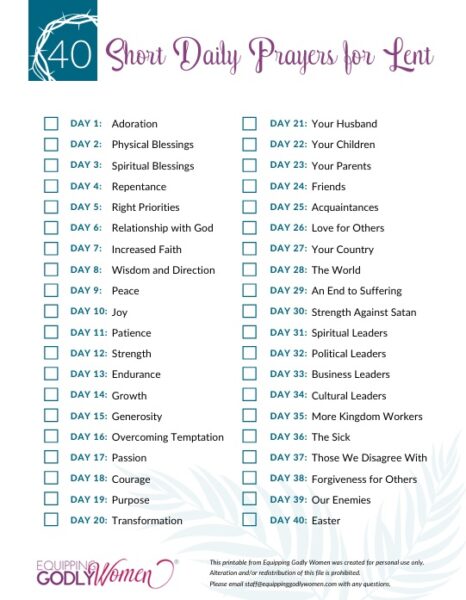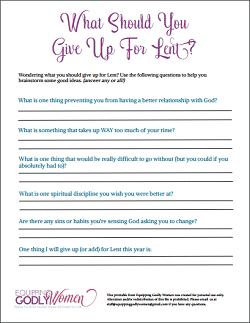Is Lent Biblical? Where is Lent in the Bible?

Growing up in a Protestant (Baptist) household, our family never observed Lent.
I don’t remember anyone being specifically opposed to it. It just wasn’t something we did.
So when I married into a Catholic family – who does participate in Lent – I had a lot of learning to do!
Over the last several years, I’ve done a TON of research into what Catholics and Protestants believe and why.
And I’ve put together several helpful guides, such as What Catholics Can Eat During Lent (PDF) or these 50+ Lent Recipes You’ll Love to Make — because these were resources *I* needed when I was learning!
Thankfully, as I’ve shared these posts, most people have been super supportive and genuinely interested in learning more about what everyone believes and why, and that’s great!
Occasionally, however, I’ll get concerned emails asking questions such as, “Where is Lent in the Bible?” “Is Lent Biblical?” or “What does the Bible say about Lent?” from well-meaning Christians who might have learned some Catholic myths and misconceptions along the way. And that’s great too!
Honestly, I think it’s wonderful when Christians ask genuine questions that foster real, open discussion, rather than simply automatically shutting people out who think differently than they do. I love that!
So, with that being said, if you’re wondering, “Is Lent Biblical?” or “Where is Lent in the Bible?” this article is for you.
Here’s what you’ll learn:
What is Lent?
Lent is a 40-day (six-week) period of spiritual preparation leading up to Easter Sunday in which many Christians reflect on Christ’s death and resurrection.
Not all Christian denominations celebrate Lent, but many do. Lent definitely isn’t just for Catholics!
Christians who do participate in Lent typically do so in a number of different ways. While Catholics will typically participate by getting ashes on their foreheads and following special Lenten fasting rules, everyone can participate by choosing something to give up for Lent, going to church, or by committing to praying Lenten prayers for spiritual renewal.
It’s kind of like Christmas… While there are several traditions most families have in common, everyone prepares for Jesus’s coming in their own special way. Just like Advent helps Christians prepare their hearts to celebrate Christ’s birth, Lent helps Christians prepare their hearts to celebrate Christ’s death and resurrection.
Is Lent Catholic or Christian (Protestant)?
Both Catholic Christians and Protestant Christians celebrate Lent, though Lent is more commonly observed among Catholics than Protestants.
Catholic Christians commonly attend Ash Wednesday church services, where they receive ashes on their foreheads. They may choose to voluntarily give something up for Lent, but they are required to follow these Lenten fasting rules.
Protestant Christians may attend an Ash Wednesday service, where they receive ashes on their foreheads. They may voluntarily give something up for Lent. But they are NOT required to (and typically don’t) follow any Lenten fasting rules. Lent is completely optional for Protestants.
Take the 40-Day Lent Prayer Challenge!

Ready to get more intentional with your prayers — without getting distracted by your phone or computer?
Grab this Lent Prayers printable PDF and put it somewhere you’ll see it often to remind you to take time for uninterrupted prayer.
This handy cheat sheet contains all 40 Christian prayers for Lent plus a handy checklist. It’s yours free. Where should I sent it?
When is Lent? (When Does Lent Begin and End?)
This year, Lent begins on Ash Wednesday, March 5, 2025. In the Roman Catholic Church, Lent ends on the evening of Holy Thursday, April 17, 2025. In many Protestant denominations, Lent ends on Easter Sunday morning.
The exact dates of Lent vary every year, but the Lenten season always starts on the Wednesday six and a half weeks before Easter Sunday (known as Ash Wednesday).
- Lent is 46 days if: You count from Ash Wednesday until Easter Sunday – not counting Easter.
- Lent is 40 days if: You count from Ash Wednesday to Easter Sunday – not counting any Sundays. (The Roman Catholic church considers Sundays as a day of celebration, not a day of penance.)
Where is Lent in the Bible?
Lent is never mentioned in the Bible. Instead, Lent is a popular spiritual practice that has grown over time since the early Church began observing it in (or before) the second century.
Is Lent Biblical?
While Lent isn’t specifically commanded in the Bible, most Lenten practices do align closely with Scripture.
It’s important to remember: There’s a big difference between “not in the Bible” and “against the Bible.”
Just because something isn’t included in the Bible doesn’t automatically make it “bad,” and just because something is included in the Bible doesn’t automatically make it “good.”
For example, church potlucks, Sunday School, Christmas plays, weekly bulletins, church websites, the Sinner’s Prayer, and baby dedications are not in the Bible. Murder and adultery, on the other hand, are in the Bible.
Every church (and every family) has their own traditions and practices that are meaningful to them, and that’s a great thing!
See also: Who Has the Ultimate Authority? A Biblical Look at Sola Scriptura.
What is the History of Lent?
According to ChristianityToday.com, Lent is one of the oldest observances in the Christian calendar. In fact, Christians were participating in some form of Lent before the church formally decided which books would make it in the Bible.
“Early church father Irenaus of Lyons (c.130-c.200) wrote of such a season in the earliest days of the church, but back then it lasted only two or three days, not the 40 observed today.”
After Christianity became legalized in 313 A.D. and the Council of Nicea took place in 325 A.D., the Church began to formalize how Lent would be observed.
According to this article on the history of Lent:
“Historians generally agree that the 40-day period before Easter, known as Lent, emerged shortly following the Council of Nicea in 325 AD. Earliest observances of Lent seem to have focused particularly on the practice of fasting. Council records suggest that the fast applied at first mainly to new converts as a period of repentance and reflection before baptism at Easter. In any case, Lent quickly became a general practice churchwide. The actual 40-day period varied region-to-region, even church-to-church; some including weekends, some not; some fasting Sundays, others not. But in every case, the fast was strict: one meal a day after 3 PM with no meat, fish, or dairy. It was Pope Gregory I (590 – 604) who finally regularized the period of the fast churchwide, to begin on a Wednesday 46 days before Easter with a ceremony of ash, and not to include Sundays, which were perennial days of celebration.”
While Lenten practices remained largely unchanged for centuries, eventually, the Catholic Church did begin to relax its standards to our current guidelines, which are much easier to keep.
According to the same source:
“By the 1400s, Christians had begun eating the one meal earlier in the day, and later began to add a smaller meal to keep up their strength for work. Eventually, the one-meal restriction was lifted altogether… [T]he number of obligatory fasting days decreased incrementally from six days a week to three, and then eventually, to just two in the whole season of Lent.”
Meanwhile, various Protestant denominations developed their own sets of rules and guidelines over time for how the Lenten season would or would not be celebrated.
This is why Catholics celebrate a specific 40-day period with precise Lent rules and guidelines (the Catholic church has been around for a long time), while Protestant churches vary widely in how they participate, if they participate at all.
What Does the Bible Say About Lent?
While Lent isn’t mentioned in the Bible specifically, all of the most popular individual Lenten traditions come straight from Scripture.
- Almsgiving (Giving to the Poor): Leviticus 25:35, Proverbs 19:17, Matthew 19:21, Luke 6:38, Luke 11:41, Acts 10:2, Hebrews 13:16, 2 Corinthians 9:5-7, 1 Timothy 6:18, 1 John 3:17
- Ashes: Leviticus 6:11, Numbers 4:13, Numbers 19:17, Esther 4:3, Job 42:6, Ecclesiastes 3:20, Isaiah 58:5, Daniel 9:3, Hebrews 9:13
- Attending Church: Psalm 150:1, Acts 2:42, Hebrews 10:24-25
- Fasting: Exodus 34:28, Ezra 8:23, Psalm 69:10, Joel 1:14, Joel 2:12, Nehemiah 1:4, Matthew 6:16-18
- The Number 40: Genesis 7:4, Exodus 24:18, Jonah 3:4, Matthew 4:1-2
- Prayer: Jeremiah 29:12, Jeremiah 33:3, Matthew 6:6-7, Mark 11:24, Philippians 4:6, I Thessalonians 5:16-18, James 5:16
- Repentance: Proverbs 28:13, Matthew 3:2, Matthew 4:17, Luke 13:3, Luke 15:7, Luke 17:3-4, Acts 3:19, Acts 8:22, 2 Peter 3:9, Revelation 2:5
- Scripture Reading: Joshua 1:8, Psalm 119:11, Psalm 119:105, Romans 15:4, Colossians 3:16, 1 Timothy 4:13, 2 Timothy 3:16, Hebrews 4:12
- Self-Denial (Abstinence): Psalm 119:9, Proverbs 25:28, Matthew 16:24, 1 Corinthians 9:27, 1 Corinthians 10:13, Galatians 5:24-25, Colossians 3:5, Hebrews 13:5, 1 Peter 2:11, 1 Peter 5:8
- Self-Examination: Psalm 139:23-24, 1 Corinthians 11:28, 2 Corinthians 13:5
- Self-Sacrifice: Matthew 10:39, Romans 12:1, Hebrews 13:16
While the Bible doesn’t command people to observe Lent, Lent is a great way to help people follow the Bible’s commands.
In fact, many people who voluntarily choose to give something up for Lent or to start a new spiritual discipline (such as praying daily Lenten prayers or studying the Bible) do so in order to grow spiritually during the Lenten season.
So while Lent itself isn’t in the Bible, most of the ways Catholics and Protestants celebrate Lent are in the Bible.
But What About Catholic Lent? Is Catholic Lent Biblical?
The Roman Catholic church does require its members to follow certain guidelines, which are not expressly commanded in Scripture. (Lent is completely optional for Protestants.) However, just because something isn’t mentioned in the Bible doesn’t mean it’s against the Bible.
For a great explanation of why Catholics participate in Lent, check out the video, “Where is Lent in the Bible” by Father Mike at Ascension Presents.
Father Mike is a Catholic priest (with an active YouTube presence) who always does such a great job of explaining what Catholics believe and why in a way that’s fair, welcoming, and kind.
He doesn’t use a lot of Catholic jargon that’s hard to understand, and he’s never rude, annoying or preachy. You can tell he’s genuinely excited and passionate about being Catholic (which is great!), but his messages are still very accessible and approachable for curious non-Catholics (like me!) as well.
So if you’ve been wondering, “Is Ash Wednesday Biblical?” or “Why do Catholics celebrate Lent?” this video will help.
What Does the Bible Say About Lent in 1 Timothy 4:3-4?
In the interest of full disclosure, as I was researching this question of “Where is Lent in the Bible?” I did come across one passage that initially threw me for a loop:
“The Spirit clearly says that in later times some will abandon the faith and follow deceiving spirits and things taught by demons. Such teachings come through hypocritical liars, whose consciences have been seared as with a hot iron. They forbid people to marry and order them to abstain from certain foods, which God created to be received with thanksgiving by those who believe and who know the truth. For everything God created is good, and nothing is to be rejected if it is received with thanksgiving.” —1 Timothy 4:1-4
This passage really made me stop and think, because it seems very anti-Lent on the initial reading. But a little understanding of the history of the Church helps clear it up:
So first, it’s important to understand that when Paul wrote his letter to Timothy, he was writing to a specific person in a specific situation at a specific time.
(In other words, while we can read and benefit greatly from Paul’s letter today, his words weren’t specifically written TO us in the exact situations we face today.)
At that time, many of the early Christians were Jewish people who were used to following a TON of Jewish law. In fact, pre-Christ, their entire salvation rested on their ability to follow ALLLL these Old Testament rules to the letter. If they messed up, it meant being cut off from God and their people.
As a result, the Jewish people of this time took the laws VERY seriously–and for good reason!
However, when Christ came and replaced the Old Testament legal system with the New Testament system of grace, many of the early Christians were still understandably very confused about which rules they still had to follow and which rules they could safely disregard.
You can see this elsewhere in Scripture, such as in Galatians 5:12 (Paul arguing that Christians don’t have to be circumcised to be saved) and 1 Corinthians 8 (Paul arguing that it’s okay to eat meat sacrificed to idols).
Well, in this 1 Timothy passage, apparently there was a minority group called the “Encratites” who were trying to forbid Christians from ever marrying or eating meat.
They thought meat and marriage were morally wrong for all Christians everywhere, and they were preaching this heresy widely enough that it was causing problems. (You can read more about the Encratites here)
So, when Paul wrote 1 Timothy 4:3-4, he wasn’t condemning the practice of temporarily fasting from certain foods as a helpful spiritual discipline (which is encouraged elsewhere in Scripture). He was speaking in opposition to the ideas of one specific group of people whose incorrect teachings were confusing the beliefs of a young and impressionable church.
To be clear, Catholics today do not practice Lent or abstain from meat in order to earn salvation. They do it simply as a helpful spiritual discipline to focus their hearts and minds on Jesus in the 6 weeks leading up to the celebration of Jesus’s death and resurrection.
What Should You Give Up for Lent? (Let’s Find Out!)

Instead of picking something random from a list, why not choose the option that will give you the biggest impact?
Take the “What Should You Give Up for Lent?” self-assessment and discover your biggest opportunities for growth this year.
It’s 100% free. Just let me know where to send it!
Are you participating in Lent this year? Are there any other Scripture verses related to Lent in the Bible that I should know about? Feel free to share below!
![What to Give Up for Lent 2021: Get the 50 [Best] Lent Ideas!](https://equippinggodlywomen.com/wp-content/uploads/2019/01/What-Should-I-Give-Up-for-Lent-blog-600x375.jpg)

![What to Give Up for Lent 2021: Get the 50 [Best] Lent Ideas!](https://equippinggodlywomen.com/wp-content/uploads/2016/02/What-Can-You-Eat-During-Lent-blog-600x375.jpg)








Hi! I really enjoyed your post! I am catholic and I was unsure about eggs, so this was informative for me. I just wanted to say, you should just come on and join us already! Nothing compares to receiving Jesus in the Eucharist (Communion)! The activities during Lent are also very helpful for repentance, like the stations of the Cross and the Living Stations (live reenactment of the Passion of Christ on Good Friday). I am very thankful to have married into a Catholic family and that I am raising my children catholic and they will able to receive the sacraments. My 4 year old already knows the Our Father, Hail Mary, Glory Be, and Guardian Angel. She knew the Our Father since she was 3. I grew up in the Methodist church and also knew the Our Father very well, but not until I was much older. I really like the fact that the catholic church is very structured in its class requirements for sacraments and I have learned so much since joining the Church 7 years ago. Also the sacrament of Penance (Confession) really helps you develop conscious awareness of sin and overcome sins with the help of Jesus. The way Catholics see salvation can be related to a marriage. If you say you love your husband, but you never spend time with him, never make any sacrifices for him, do you really love him? Catholics, like Protestants, believe that our works are not what saves us, but they are how we show we truly love the Lord. I do believe the salvation prayer begins to allow the Holy Spirit to work in your life, but the sacraments are 100xs more powerful. Its like if you had been ignoring your husband and then you write him a letter apologizing and then think that is the last thing you have to do to have a happy marriage, it does not make sense. No you write the letter and then you start changing your behavior and seek counseling if needed and then your chances of a successful marriage increase. Their are so many verses in the bible that explain salvation not easy (Romans 3:8, 10:9, Matthew 7:13, 19:24-26, 25:41-42) Yes faith is by grace and a gift we could have never earned on our own (Ephesians 2:8), but how do we come to be in a state of grace? If I am living with a man and we are not married, if I say the salvation prayer, am I really going straight to heaven, although I refuse to turn from my sin? This seems to be a dangerous doctrine.
Lent is yet another man made fabrication (of which the Catholic church is master at and then defending its wrongness in direct opposition to JC’s words) and not of the bible or of the church of Jesus Christ.
Yes the individual aspects are biblical and admirable to follow but the combination is man made and not to be confused with Jesus’s teachings. It’s important to constantly read the bible to know and follow the true teachings of JC in your true, personal relationship with Yeshua. Otherwise we end up following the fabricated man made version – a slippery slope of misinformation and confusion, cemented as pseudo-truth over the centuries, as has happened here.
We are all Christians of the church of JC first – following only his word, not the religious diversions of it. We all have our place on the battlefield as fellow Christians of different denominations and must discern and respect God’s individual plan for each of us, for in turn, to come together in full support of each other and JC in victory as God plans it.
Thank you for this very interesting article and all the links that helped me look at specific areas I was curious about. Like many Christians, I have given up a variety of things during Lent and even knew the basic idea of what Lent was about. This year I would like to add praying specifically that all Christians unite in love , instead of the anger, and divisions I have seen so many do these past few years. Jesus commanded us to love our neighbors as ourselves. As to giving up something. I have decided to do that this year, although I haven't for many years. I have developed the bad habit of staying in bed after waking, for long periods. I read devotionals. scroll through a little social media, text others, and pet the cats. A luxury since retiring. But it has gotten in the way of true Bible study time, time with my husband , and keeping the house more tidy. It is time to give that up. It will be hard, but isn't the point? sacrifice isn't about giving of our excess or out of guilt. It is about truly giving something personal, for the right reasons…to glorify God. Thank you Jesus as you bless each of reading and sharing from our hearts!
Thank you for sharing what you are doing for Lent. I love that you are adding prayer in addition to giving up something.
Matthew 6 verse 1 says “Be careful not to practice your righteousness in front of others to be seen by them. If you do, you will have no reward from your Father in heaven."
It goes on to list things you are to do in private and fasting is one of them (verses 16 &17)
“When you fast, do not look somber as the hypocrites do, for they disfigure their faces to show others they are fasting. Truly I tell you, they have received their reward in full. 17 But when you fast, put oil on your head and wash your face, 18 so that it will not be obvious to others that you are fasting, but only to your Father, who is unseen;"
The very nature of Lent announces to the world that you are fasting – be it food or an activity or something else. Not only is Lent not commanded, it actually violates Jesus' command.
I do not celebrate Christmas (Jesus asked us to remember his death, burial, and resurrection) or Passover as I am not now nor would I have been then a Jew. Matthew 15:9 warns against man made restrictions. But in vain they do worship me, teaching for doctrines the commandments of men. Likewise the Bible set all the positions the church is authorized to have. Any position outside these are unscriptural. Matthew 7:21-23 tells us of the consequence of putting our spin on His word.
Thank you for sharing your thoughts!
I participate in lent for greater spiritual focus. This year I give up more of my time to help others and I plan to have this behaviour firmly installed in my life so that it lasts permanently, not just for 40 days.
That is such a great idea! I love that your goal is take what you are doing for Lent and make it a permanent part of your life.